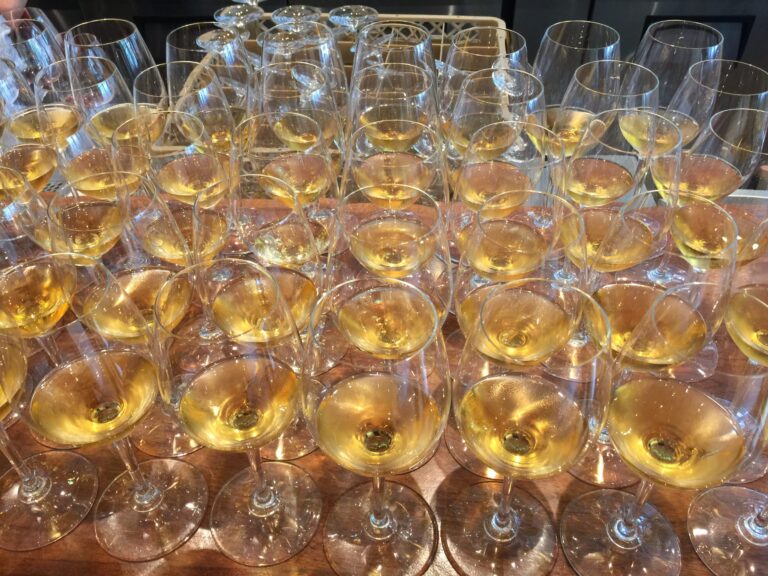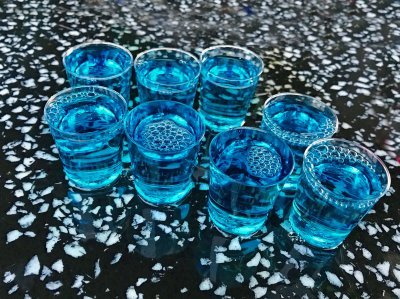The following blog was featured on il Marco Polo on February 14, 2021.
In this engaging article, we will highlight a very beautiful, but often little-known topic, the differences between a Sommelier and a Wine Taster. They maybe subtle but there are differences.
As always, I will be engaging with Dr. Clinton Lee, a very dear friend, who is a highly respected wine-professional, recognised worldwide in the enology and viticulture sector.
Sommelier and wine taster, are two distinctly different figures who often tend to be confused or incorrectly addressed. They actually represent two distinct and separate professions. They have common and intersecting aspects. Both have the final purpose of evaluating wine but from different perspectives and this affects their professional scope and work. Basically, both figures share a training aimed at possessing in-depth knowledge of wines, their physical and organoleptic characteristics and naturally the fundamental notions for carrying out both activities.
Now, let’s see in detail what their working differences are:
The “Wine Taster” mainly focuses on:
- Technical
- Qualitative characteristics of the wine.
Their task is to provide a technical judgment and identify any defects of a particular type of wine. The taster is a key and important figure in wineries. Their task of tasting wines from the cask before they are bottled and put on the market, is to identify problems or improvements and if necessary, suggest corrections to be made. It is the taster who certifies the quality of the wines we drink every day.
The taster, also called the “wine taster”, in theory, does not have to deal with the presentation of the wine in the restaurant, hotel or other environment where wine is sold and presented. They are not concern with the dining room environment, the drafting of a wine list, the annexed proposal of food and wine in gastronomic pairing (called precisely pairing food-wine) nor the management of the cellar.
The taster is mostly oriented to harness the appropriate technical tools to formulate the judgment on the qualities of a wine. They analyze the wines in order to evaluate them according to parameters from an objective aspect. Their judgment must highlight the positive or negative characteristics of wine (defects) to assign a score and, or, make any corrections.
The Sommelier, on the other hand, focuses on the:
- Organoleptic and
- Sensorial characteristics of the wine.
They judge the flavour, texture, aftertaste in order to identify the right combinations with the dishes. The sommelier is a key figure in wine bars and restaurants, where he acts as support and assistance to customers in order to recommend the best wine to pair with the lunch and dinner courses. Both the Sommelier and the Wine Taster share a deep knowledge of the wines they judge and describe on the basis of technical and qualitative parameters and standards. As for the sommeliers, specific tasting courses are also organized for tasters aimed at creating professional figures that are increasingly in demand in Italy and abroad.
How a Wine Taster and Sommelier taste and evaluate wine.
- A taster and a sommelier taste differently.
- The sommelier can refer to markers of a specific wine (the famous notes of chocolate, tomato leaf, currant and black pepper and all those markers of vines or winemaking and ageing techniques): a story, sometimes poetic, involving the memory and the evocative power of images.
- The taster, on the other hand, is oriented to eliminating as much as possible the margins of subjectivity in the analysis of wine and the tasting results in a quantitative evaluation: a score to be expressed in hundredths.
- Wine taster and sommelier have both common skills but also difference that vary and are exclusive to them.
Both professions have a common interchangeable ground: the practice of tasting.
Both the sommelier and the wine taster, of course, taste the wine and have a grammar capable of establishing taste-olfactory evaluation parameters and translate them into something else.
Now, let’s move on to analyze what are the objects of study and practice of a taster and a sommelier, to try to grasp the differences.
What it means to be or become a wine taster
The professional wine taster is a wine taster who works in producing companies (Winery).
The taster’s job consists of developing a technical evaluation, an opinion, on a particular wine in order to grasp its positive and possibly negative characteristics (the so-called defects). The practice of tasting takes place before bottling. Why? Because obviously, in consultation with the winemaker, any corrective actions aimed at eliminating (or at least trying) the defects found in the wine can be defined.
Can a winemaker be a taster and vice versa?
A winemaker, without a doubt, can be a taster and in most cases, in fact, they are. An oenologist has a more solid theoretical-scientific background, depending on the achievement of an academic path: a degree in enology. Although the oenologist maybe a taster, most of the time he exercises a different profession, which is precisely that of the oenologist. The Enologist follows all the phases of wine production: from the production of the grapes to the definition of the processing protocol, to the evaluation of the quality of the grapes, up to the bottling and marketing of the finished product. production of a safe, ethically correct wine, pleasant from an organoleptic point of view.
What it means to be a Sommelier
A wine taster can also be a sommelier and vice versa. However, the sommelier is mostly a wine communicator. The tasting of wine by the sommelier is a piece of a world that is not aimed solely at the translation into an evaluation sheet that highlights the positive and negative characteristics of the wine, as it is for the taster. The sommelier tastes wine and evaluates it because this wine must in a certain sense be shared with a potential customer, paired with a particular dish, stored in a special cellar.
They are concerned with the conservation, sale, communication, proposal, matching with food and the practice of a more or less formal service revolve around wine. For example, the sommelier must know the right glasses to serve each wine, but also the correct way to open a bottle of wine.
As you have seen, the world of these two professionals is very interesting, there are only two countries where we can find them, France and Italy. A few months ago, an Italian friend, Dr. Luigi Demartino, who holds a not only a Bachelors degree in agriculture but also two other Master Degrees, asked me if it would be would be interesting to create courses that cover the wine taster and the sommelier and have a practical trade use and association. I replied, “That the idea was excellent.”
I would like to ask my friend Dr. Clinton Lee, what do you think technically of these two professionals? and also why according to you, they only exist in Italy and France.
I think that if they would exist else-where there would be more jobs available, but above all, there would be a great support for Oenologists.
“Change is the only constant we have in life. The flavors, styles of wine, aroma, quality and color are reflections and tell the story of the wine. The methodology of making and producing wines is the writing of that story. So, it does make sense that we have the story teller, in this case represented by the “Sommelier” and the story writer in this case represented by the “Wine Taster”.
Both read from the same language and write in the same format but emphasize a different facet. Technically, the “Wine-Taster more often than not is the wine-maker, who has seen their little buds grow into mature juicy grapes ready to produce great “must” and eventually transform to wine. The technical aspect of the wine is vitally important. The mouth-feel, acidity, Ph balance, alcohol levels, balance are crucial to producing a wine both from an objective view and subjective. Can this aspect be transplanted as a singular profession? In larger wine making countries I believe there is an opportunity, hence the world’s largest producers Italy and France have the Wine Tasters. It may take some time before small operations can make the difference of this role for the wine-maker and wine-taster.
The Sommelier cannot be divorced from the romance, calm and enjoyment of the wine being presented and having that fulfilling experience. Their role is important as it brings the story to light, they are the actors in the wonderful story who know their lines, themes and history of those wines. Each of these professions are different but intertwined inextricably. Dr. Luigi Demartino has vision and the creation of such a course would be fulfilling, exciting and open up such professions as an option.
I conclude by thanking Dr. Clinton Lee once again, for his great availability, and I suggest you look at the very interesting website of APWASI where Dr. Clinton Lee is the Executive Director.
Interested in Gaining Practical Skills to become a Sommelier or Wine Taster?
Take our most popular course APWASI Wine Essentials 1 and start your wine education journey today.




